News Archive
RPI School of Engineering has named R. Helen Zha, Ph.D., as a Dean’s Faculty Fellow, recognizing her exceptional accomplishments in research, education, and service.
Rensselaer Polytechnic Institute (RPI) has announced the appointment of Zheyu Zhang, Ph.D., as the inaugural Richard P. Felak ’66 ’67G and Joan C. Felak Endowed Faculty Fellow in Electric Power Engineering.
The Howard P. Isermann Department of Chemical and Biological Engineering, in partnership with the School of Engineering at Rensselaer Polytechnic Institute (RPI), is proud to announce Mattheos Koffas, Ph.D., as the recipient of the inaugural Feltham ReEqu
RPI School of Engineering has named R. Helen Zha, Ph.D., as a Dean’s Faculty Fellow, recognizing her exceptional accomplishments in research, education, and service.
Rensselaer Polytechnic Institute (RPI) announced the appointment of Professor Jennifer Pazour, Ph.D., from the School of Engineering and Professor M. Hakan Hekimoglu, Ph.D., from the Lally School of Management as James M. Tien ’66 Dean’s Faculty Fellows in Decision Sciences and Engineering Systems (DSES).
Rensselaer Polytechnic Institute (RPI) has announced the appointment of Zheyu Zhang, Ph.D., as the inaugural Richard P. Felak ’66 ’67G and Joan C. Felak Endowed Faculty Fellow in Electric Power Engineering.
Rensselaer Polytechnic Institute (RPI) is proud to welcome the second cohort of Hudson Valley Community College (HVCC) students to the Semiconductor Scholars Program, an initiative supported by NORDTECH DoD Microelectronics Hub.
Rensselaer Polytechnic Institute (RPI) has received a $10 million gift from Ajit Prabhu ’98, founder and CEO of Quest Global, to establish the Ajit Prabhu Catalyst Endowment and the Ajit Prabhu Catalyst Fund, both in support of the Office of Strategic Alliances and Translation (OSAT). Prabhu launched the fund, which will assist RPI student and faculty entrepreneurs.
Rensselaer Polytechnic Institute (RPI) has received a $10 million gift from Ajit Prabhu ’98, founder and CEO of Quest Global, to establish the Ajit Prabhu Catalyst Endowment and the Ajit Prabhu Catalyst Fund, both in support of the Office of Strategic Alliances and Translation (OSAT). Prabhu launched the fund, which will assist RPI student and faculty entrepreneurs.
Rensselaer Polytechnic Institute (RPI) is proud to announce that Pingkun Yan, Ph.D., associate professor of Biomedical Engineering at RPI, has been appointed chair of the IEEE Engineering in Medicine and Biology Society (EMBS) Technical Committee on Biomedical Imaging and Image Processing (BIIP).
Rensselaer Polytechnic Institute’s Georges Belfort, Ph.D., and Steven Cramer, Ph.D., both Institute Professors of Chemical and Biological Engineering, have won the 2025 Bernard M. Gordon Prize for Innovation in Engineering and Technology Education given by the National Academy of Engineering.
Lung cancer is one of the most challenging diseases, making early diagnosis crucial for effective treatment. Fortunately, advancements in artificial intelligence (AI) are transforming lung cancer screening, improving both accuracy and efficiency.
Ge Wang, the Clark-Crossan Chaired Professor and director of the Biomedical Imaging Center at Rensselaer Polytechnic Institute (RPI), has been appointed as the editor-in-chief of the IEEE Transactions on Medical Imaging journal. With nearly 3,000 submissions per year, it is the flagship journal in the tomographic medical imaging field and among the most highly cited of all biomedical engineering journals. Wang’s initial term is for three years and is renewable for a second term.
Clint Ballinger, Ph.D., professor of practice in the Department of Mechanical, Aerospace, and Nuclear Engineering (MANE) at Rensselaer Polytechnic Institute, is among 170 inventors elected by the National Academy of Inventors (NAI) to its 2024 Class of Fellows.
TROY, N.Y. — Building on several ongoing collaborations, Rensselaer Polytechnic Institute (RPI) and GlobalFoundries (GF) are working together to further grow and strengthen the semiconductor workforce in the region.
TROY, N.Y. — Thomas R. Farino Jr. ’67 and his wife Patricia Farino have made a $5 million gift to the Rensselaer Polytechnic Institute (RPI) School of Engineering to establish the university’s first endowed deanship. Their gift marks another milestone in RPI’s yearlong Bicentennial celebration of the Institute’s past, present, and future.
Rensselaer Polytechnic Institute (RPI) researchers are part of a multi-institution team working to bring rubber production to the United States and better secure the supply chain for this critical material.
Rensselaer Polytechnic Institute (RPI) and the Icahn School of Medicine at Mount Sinai will offer a joint Ph.D. program in health sciences engineering beginning in the fall semester of 2025. RPI is a world-renowned technological research university known for its engineering, technology, and science programs. Icahn Mount Sinai is the academic arm of the Mount Sinai Health System, which includes eight hospitals and a vast network of ambulatory practices throughout the greater New York City region. The Ph.D.
On July 18, Rensselaer Polytechnic Institute (RPI) and NORDTECH will host a day-long Workforce Development Summit on the RPI campus that will bring together government, industry, nonprofits, and academic partners to address education and workforce development in chips and semiconductors critical to the prosperity and security of the nation.
On July 18, Rensselaer Polytechnic Institute (RPI) and NORDTECH will host a day-long Workforce Development Summit on the RPI campus that will bring together government, industry, nonprofits, and academic partners to address education and workforce development in chips and semiconductors critical to the prosperity and security of the nation.

 R. Helen Zha Named Dean’s Faculty Fellow in Engineering at Rensselaer Polytechnic Institute
R. Helen Zha Named Dean’s Faculty Fellow in Engineering at Rensselaer Polytechnic Institute
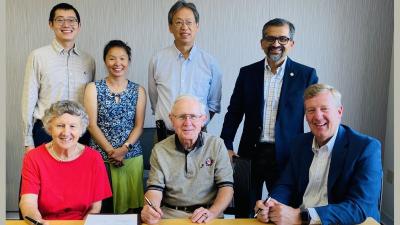 Zheyu Zhang Appointed Richard P. Felak ’66 ’67G and Joan C. Felak Endowed Faculty Fellow in Electric Power Engineering at RPI
Zheyu Zhang Appointed Richard P. Felak ’66 ’67G and Joan C. Felak Endowed Faculty Fellow in Electric Power Engineering at RPI
 Mattheos Koffas Receives Inaugural Feltham ReEquip Award to Advance Genome Editing Research
Mattheos Koffas Receives Inaugural Feltham ReEquip Award to Advance Genome Editing Research
 Pazour and Hekimoglu Named James M. Tien ’66 Dean’s Faculty Fellows in Decision Sciences and Engineering Systems
Pazour and Hekimoglu Named James M. Tien ’66 Dean’s Faculty Fellows in Decision Sciences and Engineering Systems
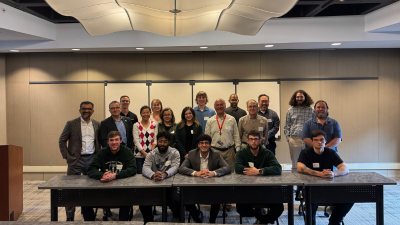 RPI Welcomes Second Cohort of HVCC Semiconductor Scholars Through NORDTECH Partnership
RPI Welcomes Second Cohort of HVCC Semiconductor Scholars Through NORDTECH Partnership
 RPI Announces $10 Million Gift from Alumnus and Entrepreneur Ajit Prabhu
RPI Announces $10 Million Gift from Alumnus and Entrepreneur Ajit Prabhu
 RPI Professor Appointed Chair of IEEE Biomedical Imaging and Image Processing Technical Committee
RPI Professor Appointed Chair of IEEE Biomedical Imaging and Image Processing Technical Committee
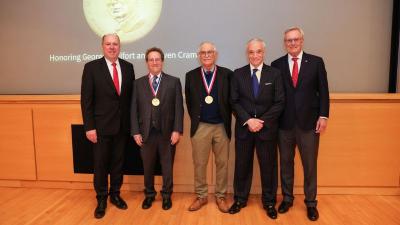 RPI Researchers Receive Prestigious Gordon Prize from National Academy of Engineering
RPI Researchers Receive Prestigious Gordon Prize from National Academy of Engineering
 Multimodal Multitask Foundation Model Enhances Lung Cancer Screening and Beyond
Multimodal Multitask Foundation Model Enhances Lung Cancer Screening and Beyond
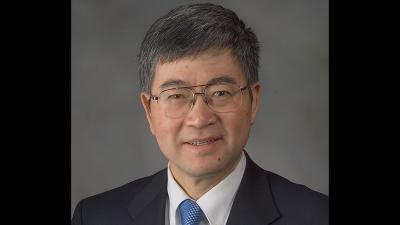 Ge Wang Named Editor-in-Chief of IEEE Transactions on Medical Imaging
Ge Wang Named Editor-in-Chief of IEEE Transactions on Medical Imaging
 Clint Ballinger Named a Fellow of the National Academy of Inventors
Clint Ballinger Named a Fellow of the National Academy of Inventors
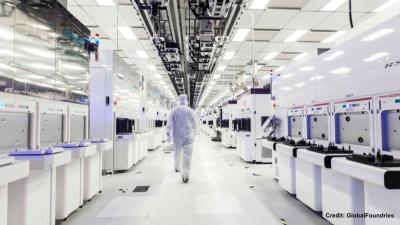 RPI and GlobalFoundries Partner on Semiconductor Workforce Development
RPI and GlobalFoundries Partner on Semiconductor Workforce Development
 First Endowed Deanship at RPI Honors Alumnus’ Formative Student Experience
First Endowed Deanship at RPI Honors Alumnus’ Formative Student Experience
 RPI Researchers Part of NSF-Funded Engineering Research Center Focused on U.S. Rubber Industry
RPI Researchers Part of NSF-Funded Engineering Research Center Focused on U.S. Rubber Industry
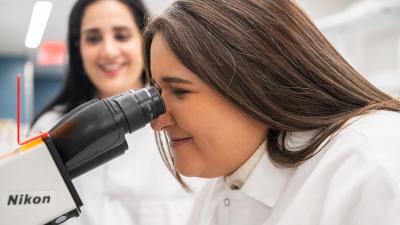 Rensselaer Polytechnic Institute and the Icahn School of Medicine at Mount Sinai to Offer Joint Ph.D. Program in Health Sciences Engineering
Rensselaer Polytechnic Institute and the Icahn School of Medicine at Mount Sinai to Offer Joint Ph.D. Program in Health Sciences Engineering
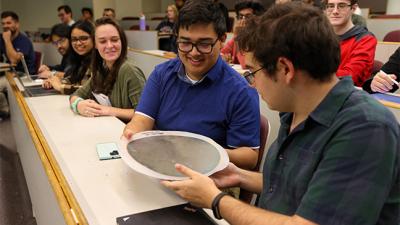 RPI To Host NORDTECH Workforce Development Summit
RPI To Host NORDTECH Workforce Development Summit